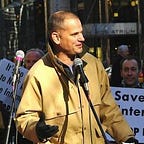For far too long, media execs have played along with Donald Trump’s strongman charade, aware that his tele-presence is a boon for ratings and revenues. Now, U.S. democracy is reaping what they have sown.
At a speech delivered on Veterans Day, Trump used rhetoric nearly identical to that used by Adolf Hitler 80 years earlier.
Rather than honoring veterans as one might expect of a political speech on this day, Trump used the occasion to label his adversaries “vermin” — promising that, if elected, he would use his power to “root out” all his political enemies.
The Washington Post’s Aaron Blake found the parallels: Hitler frequently used vermin references to justify the murder of Jews and others across Europe, while “Trump has used it more broadly to suggest that his opponents are subhuman” and deserve punishment.
Parroting Hitler should not be considered normal behavior in any U.S. election cycle. But the media have grown used to covering Trump’s extremism as if it’s standard political fare. This time, though, some journalists rightly saw his Veterans Day speech as very dangerous.
“It’s important to emphasize that Trump’s rhetorical excesses are not new. To know anything about the Republican is to know that he, on a nearly daily basis, finds new and needlessly provocative ways to shock, offend, insult, and degrade,” wrote Steve Benen for MSNBC.
What is new, however, is the growing number of reporters and commentators being more explicit in their use of the term “fascist” to describe Trump’s beliefs — and “dictatorship” to describe what his return to power would represent for the future of U.S. democracy.
The media aren’t sounding these sorts of alarms enough, according to Margaret Sullivan, who wrote about the mounting evidence that Trump is indeed a fascist. “The press generally is not doing an adequate job of communicating those realities,” she said. “Instead, journalists have emphasized Joe Biden’s age and Trump’s ‘freewheeling’ style. They blame the public’s attitudes on ‘polarization,’ as if they themselves have no role.”
Sullivan urges more members of the press to report on the dark prospect of a second Trump presidency. They should “ask voters directly whether they are comfortable with [Trump’s] plans, and report on that. Display these stories prominently, and then do it again soon,” she wrote.
The ‘F’ word
Sullivan is right, of course. The media need to report more on the rise of fascism in America, and they also need to reflect on their role in enabling this.
For decades the former president has capitalized on the media’s obsessive attention to paint an alternative vision of himself — one in which he features not as a twice-impeached, criminally indicted sexual abuser who sought to overthrow a democratic election that he lost, but as a decisive and winning strongman, the only person with the power and charisma to make America great again.
In 2016, then-CBS CEO Les Moonves said that devoting so much airtime to then-candidate Trump “may not be good for America, but it’s damn good for CBS.” At the time, Moonves was praising Trump for the bumper crop of political-ad dollars brought in during the contentious 2016 election, but he was not alone.
Former media executive Jeff Zucker has arguably done more than any single person to burnish the 21st-century caricature of Donald Trump. While an executive at NBC, he greenlit The Apprentice, which remade Trump from a bankruptcy-spawning loser into a boardroom genius with impeccable business savvy.
When Trump entered the political fray in 2015, he did so with an Apprentice tailwind. Zucker, who by then had transitioned to the top job at CNN, trained the network’s cameras on his celebrity candidate while denying equal time to Trump’s Republican opponents. Ratings were also Zucker’s rationale for keeping Trump center stage in 2016.
The media chose Trump in 2016 well before most Republican voters had a chance to vote for any of the other GOP candidates in the race.
And it didn’t end there. In 2020, Mathias Döpfner, head of German media giant Axel Springer, sent a message asking the company’s executives if they wanted to “get together for an hour on the morning on Nov. 3 and pray that Donald Trump will again become President of the United States of America.” Döpfner justified this question by praising the Trump administration for supporting issues, like corporate tax breaks and reining in big tech, that benefitted Axel Springer.
The profit incentive
If you’re noticing a pattern, it’s this: Democracy suffers when a commercial media system showcases fascist demagogues for profit.
That seems obvious enough, but it’s worth repeating: News media companies rely on ratings and related advertising revenues to survive. In other words, the news business is about putting on a show that will draw the largest numbers of viewers. And Trump — like Hitler and Mussolini before him — is a camera-ready showman.
More important matters like correcting Trump’s many falsehoods or reporting on the troubling consequences of a second Trump presidency are secondary for those who just want to draw more attention to their primetime offerings.
Former executives, like Moonves and Zucker — who for a variety of unsavory reasons have since left their companies — and existing ones, like Döpfner, were saying that as long as Trump’s autocratic extremism made them richer, there was no need to worry about the consequences. Never mind that, if elected, he’d likely use his power to undermine media freedom and silence dissenting voices.
The commercial U.S. media system needs to undergo deep reckoning for accommodating the rise of Trumpism. This atonement should be reflected in a shift in the ways large outlets report on Trump, but also by recognizing the commercial incentives that drive media to lead with the Trump Show, damn the far-right repercussions.
Without calling themselves to account for the damage they’ve done, media executives will never quit their Trump habit — not in 2024, nor at any point after.
